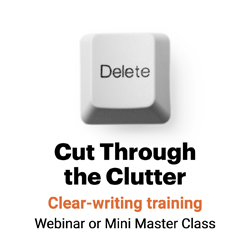Write it on a sticky note
How do you squeeze a big idea, more than 18 months of research and input from more than 3,000 constituents into a sound bite that expresses the whole purpose of your organization?

The International Association of Business Communicators found out in developing the organization’s new brand tagline. IABC leaders started with this brand positioning statement:
At 60 words, that sentence is a mouthful. So IABC leaders compressed the positioning statement into a brand promise:
At 23 words, this is a mere sliver of the original text. But it’s still not ready for prime time. So leaders condensed that big idea into a brand tagline of just two words:
Be Heard
And, with a maxim as crisp, clear and compelling as that, that’s what IABC is bound to be.
So how can you condense your big idea into a little space? Whether you’re writing a blog post or a bylined article for The New York Times, summarize your idea into:
The back of a business card
As one of my favorite college professors, R.S. Musser, used to say: “If you can’t summarize your story idea on the back of my business card, you don’t have a clear idea.”
A walkaway sentence
What’s the single sentence you want your readers to walk away with after reading your piece? That’s your story angle.
Keep that sentence to eight words or less, because that’s a length people can grasp fully at a glance, according to the American Press Institute.
An elevator pitch
Say your biggest prospect joins you on the elevator in the lobby. As you zoom up to the third floor, what one thing are you going to tell her about your product, service or idea? That’s your focus sentence.
A tweet
Christopher Smith, corporate writing and editing guru, challenges communicators to summarize their articles in 280 characters or less. This practice not only helps writers find their focus but also reveals what information is essential to your message — and what is not.
A bumper sticker or billboard
How’s this for an efficient story angle: “One if by land, two if by sea.” Of course, legend has it that Paul Revere’s famous eight-word call to action launched the American Revolution.
Can your short point drive your readers to act?
Six words
Decades after Ernest Hemingway famously crafted a six-word story — “For sale. Baby shoes. Never worn.” — to settle a bet, the six-word story format has taken off.
- SMITH Magazine calls for six-word memoirs.
- The Harvard Business Review suggests summing up your leadership style in six words.
- Sixwordstories.net is dedicated to publishing prose in six words. (Some are almost unbearably compelling: “Family’s tears hurt more than chemo.”)
A classified
Seth Godin, marketing guru and author of The Practice, suggests that you write a classified.
“What’s the offer?” he asks. “What do you want me to do? You’re paying by the word!” Because attention is expensive.
Maybe, he says, you’ll write something like:
Lose weight now. Join our gym.
“Six words,” says Godin. “Promise and offer.”
A slogan
Advertising Age’s “Top 10 Slogans of the 20th Century” all weighed in at five words or less:
- Diamonds are forever (DeBeers)
- Just do it (Nike)
- The pause that refreshes (Coca-Cola)
- Tastes great, less filling (Miller Lite)
- We try harder (Avis)
- Good to the last drop (Maxwell House)
- Breakfast of champions (Wheaties)
- Does she … or doesn’t she? (Clairol)
- When it rains it pours (Morton Salt)
- Where’s the beef? (Wendy’s)
Can you summarize your story angle into five words or less? If so, you’ve got a story angle.
Now use your summary sentence.
Your summary sentence will keep you from getting scattered. It will tell you what to put in — and what to leave out of — your copy.
____
Sources: “The IABC Brand: Briefing for IABC Chapters,” International Association of Business Communicators, January 2007

Leave a Reply